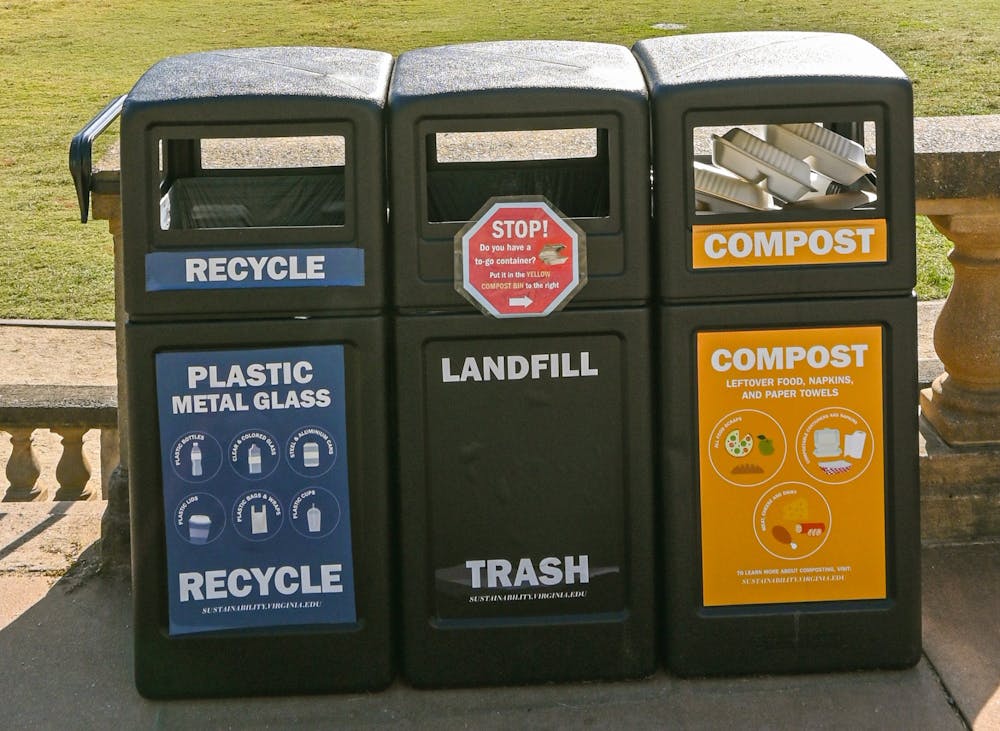This fall, the Office for Sustainability’s Green Games initiative has expanded to encompass all home games this football season.
This program provides students with a hands-on way to contribute to the University’s Sustainability Goal of reducing its waste footprint by 30 percent relative to 2010 levels by 2030. Prior to this year, the Office for Sustainability partnered with Virginia football for one game per season to reduce the amount of waste produced by the University as part of the annual GameDay Football Challenge.
The Green Games initiative is an effort from Virginia Athletics to encourage fans and volunteers to help reduce and divert waste at athletic events. It takes inspiration from the annual national challenge RecycleMania — now Campus Race to Zero Waste — that started in 2001. RecycleMania pushed universities across the country to compete to see who could divert the most trash from landfills at home basketball games, encouraging more recycling and composting.
The University participated in RecycleMania beginning in 2010. As students advocated for its continuation, this annual national event eventually transformed into an initiative more specific to the University. During the 2021-22 academic year, discussions arose at the Office for Sustainability around turning all home football games into Green Games.
Because the University already has an active recycling program that diverts paper waste, cardboards and plastics, the University’s sustainability team and involved students focused on communicating and initiating more composting at home games. The Office for Sustainability later opened the doors for students and CIOs to participate and support the initiative through volunteering.
Third-year Batten student Nora Raleigh, intern at the Office for Sustainability, said the most important aspect of this initiative is retaining volunteers.
“Help is really the main thing that we need,” Raleigh said. “It makes such a big difference. We wouldn't have the capacity to do it without that.”
From the three home football games so far this season, volunteers collected and composted approximately 4,416 gallons of waste material, per data provided by Raleigh.
A large part of the increase in volunteers this season has come from the help of CIOs to communicate the Green Games’ message. Many student organizations are using Green Games as an opportunity to provide members with a group bonding event that also gives back to the University community.
Third-year College student Jonathan Du helped organize a group outing for Supporting Oncologic College Kids and Students at U.Va. to volunteer at Green Games and found the experience challenging, but worth every minute.
“At the end of the day, when you have all the trash bags to the side and you have all the bags separated for recycling, you can kind of see the amount of the impact that you've done,” Du said.
Volunteers also have the opportunity to visit sections of Scott Stadium with an Office for Sustainability team leader to talk to visitors in the stands about the importance of diverting waste, as well as helping fans compost their waste at the game.
Lela Garner, student outreach and engagement specialist for the Office for Sustainability, has found that the student involvement with these initiatives has been a defining factor in their success.
“Students are really looking for hands-on opportunities to positively contribute to the University as a community but also specifically to sustainability efforts,” Garner said. “So something that I will note is I've been really pleasantly surprised at the number of students who are interested in volunteering and getting involved in this effort.”
Second-year College student Danae Thomas was connected with the Green Games by Ecoleaders — a division of the Office for Sustainability that operates in dorms and on-Grounds housing — and said the volunteering experience gave her a tangible way to be involved with the University.
Thomas had the opportunity to communicate directly with tailgaters the importance of sustainable practices as well as help introduce new practices, such as composting, to fans.
“We were able to engage with a lot of the tailgaters and it did end up being a rewarding experience,” Thomas said. “We also got to … stand on the actual turf and see some of the players … which I think was one of my favorite parts.”
With so many fans gathering at Scott Stadium, there are more opportunities to educate on sustainability practices while diverting waste.
“Having the opportunity to be in front of 20,000 people sorting waste, or you know, advertising the opportunity to compost can be really impactful,” Garner said.
Currently, University-generated waste levels are 38.8 percent less than they were in 2010, per the University’s annual sustainability report from 2021-22.
Green Games will continue for the rest of the football season and are planned for the coming season as well. Green Games also continues to look for volunteers for home games at Scott Stadium. Volunteers can sign up for games through this form.
“We are piloting it out this year and things have been going well,” Garner said. “So ideally, we would continue to provide volunteers and composting at … all of the football games in the near future.”







